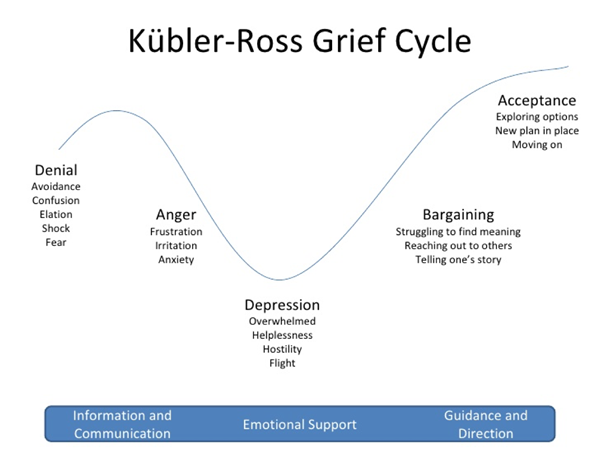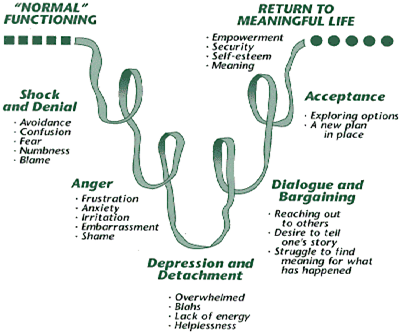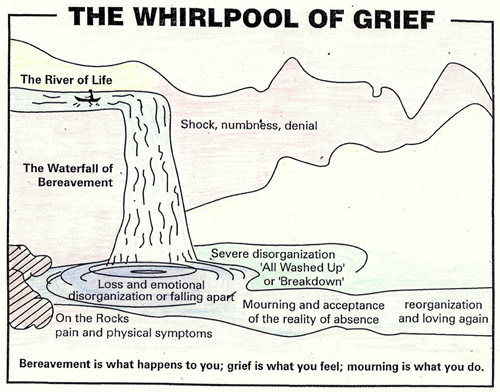Lesson 9: Grief and Bereavement
Attention

Visit the Elisabeth Kubler-Ross Foundation Website- explore the resources available. There are brief videos, as well. Additionally, Recover-from-grief.com provides resources, including coping strategies to for dealing with sorrow and four working theories about stages/tasks of grieving.

This WebMd article addresses Coping with Grief and describes dealing with grief and loss as something most people have to do sometime in their lives.
Grief is a natural response to the loss of someone or something very dear to us. Losses that may lead to grief include the death or separation of a loved one, loss of a job, death or loss of a beloved pet, or any number of other changes in life such as divorce, becoming an "empty nester," or retirement. Anyone can experience grief and loss, but each person is unique in how he or she copes with these feelings.

Read: The 5 Stages of Grief and Other Lies That Don't Help Anyone to better understand the idea of tasks, rather than stages of grief, and to acknowledge that as Elisabeth Kubler-Ross eventually wrote in her last days of her life: "I am more than these five stages. And so are you."
Learning Outcomes
Upon completion of this lesson's material, students will be able
- Explain common reactions to loss and suggestions for coping with it.
- Know the factors that contribute to the intensity of grief reactions.
- Explore and discuss the issues related to loss, grief, and mourning, and be able to recognize feelings, thoughts, and behaviors experienced when a loss occurs, regardless of the type of loss.
- Demonstrate a basic understanding regarding how to communicate and to comfort others who have experienced a loss.
- Evaluate specific theories and models of grieving.
This lesson is about grief and bereavement, keeping bereavement and mourning practices as its central theme to examine grief in different contexts.
Teaching
Read Chapter 13 in Course Text
In this lesson, we will examine different theories of grief and move on to explore experiences of individual and collective grief before considering the ways in which death is memorialized and commemorated and how this, in turn, contributes to the way that death is framed in society.
Death, dying and bereavement are fundamental and pervasive aspects of the human experience. I believe that, individuals and societies may only achieve fullness of living by understanding and appreciating these realities. The absence of such understanding and appreciation may result in unnecessary suffering, loss of dignity, alienation, and diminished quality of living. Education about death, dying, and bereavement is an essential component of life.
Please read: Grief and Mourning in Cross-Cultural Perspective and Grief Speaks: Cultures and Grief to explore in greater depth how many cultures have their own traditions, rituals and ways of expressing grief and mourning. Ted.com also offers several resources: Death is not the end- Fascinating funeral traditions from across the globe and more than a few talks- for example, any of the following:
PBS provides a great resource in their Emotional Life Series: What is grief and loss?
Watch: Sociological Theory: Death and Dying
A short introduction to how each of the major sociological theories describe issues related to aging, death and dying. This is a BRIEF overview of some ideas and was created for an undergraduate course on the sociology of death and dying.
Therapeutic Interventions for providers and practitioners to remember from: McGoldrick et al. (1991)
- Explore how the individual perceives the cause of death
- Discuss how the individual follows any burial and/or mourning rituals at the time of the death
- Examine the individual’s beliefs about life after death
- Look at beliefs about communication with the dead
- Explore family changes that followed death
Assessment
Lesson 9 Activity
Journal Discussion: Explore and discuss your personal experiences related to loss, grief, and mourning, and identify some of your own grief responses. Use the models of grief to establish a vocabulary, and give examples of grief responses using both stage theory, and other grief theories presented. Evaluate these specific theories and models of grieving. Explain others’ response to your grief, and suggest ways these responses were effective or ineffective. What could have been done differently? If you have not experienced a death, please use any significant loss: loss of a job, relationship, pet, health, etc.
Lesson 9 Discussion
Explain common reactions to loss and suggestions for coping with it. Include affective, cognitive and physical responses to grief. Identify some factors that contribute to the intensity of grief reactions, and discuss how you, as a provider may demonstrate a compassionate response. You may use personal experiences to inform this discussion, however focus on the professional challenges you may experience regarding the ideas in this discussion.
Lesson 9 Quiz
Watch any two of the TEDTalks, and use the vocabulary and resources within the lesson to demonstrate a basic understanding regarding how to communicate and to comfort others who have experienced a loss. How would you approach the experiences described in the talk? Provide evidence from the ted.com talk, but personalize the meaning and complete the essay questions:
- Which talk did you watch?
- Summarize the talk, utilizing at least four vocabulary words from this (or other) lessons within this class?
- How did this talk inform the way you will approach and/or communicate death/dying/grief issues, professionally?